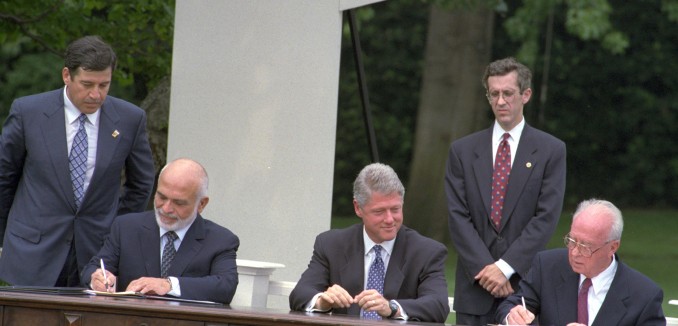Today marks the 20th anniversary of the Israeli-Jordanian peace treaty. The treaty was signed 1994 in a moving ceremony attended by Jordan’s King Hussein and Israeli Prime Minister Yitzhak Rabin. The treaty enhanced security, stability, and U.S. interests in the turbulent Middle East region.
Articles published in the past days in the Jordanian press reflect the ambivalent attitude in Jordan concerning the peace treaty. On the one hand, some of the articles praise the contributions of the agreement to Jordan, especially commercially, economically and security-wise. On the other hand there are many who argue that the agreement did not help Amman at all, demanding Jordan cancel it.
Jordanian journalist Rana Al-Sabar wrote (Arabic link) that despite the anger in the Jordanian street over Israeli policy toward the Palestinians and the recent war in Gaza, there are deep formal relationship and fruitful industrial cooperation between Jordan and Israel:
“The blood still flows in the veins of cooperation between the governments of the two sides, especially in the areas of security, water and the economy… Although relations were rocked and witnessed several complex periods, they still exist. For the administration in Jordan, the peace treaty is a red line.”
Al-Sabar wrote in the Jordanian website “Enjaz” that following the escalating war in Syria, most of Jordan’s trade relations with Europe and Turkey are conducted through Israel. In addition, goods worth $100 million were imported from Israel to Jordan every year. According to Al-Sabar, industrial projects are shared between Jordan and Israel and supposed to provide the needs of the kingdom in natural gas and energy for years to come.
Referring to the security issue, Al-Sabar said:
“The cooperation in security, military and intelligence issues (between Jordan and Israel) is at its peak, what enables the protection of common borders with Syria and the struggle against the danger of ISIS.”
In another aspect, al-Sabar noted the fact that tens of thousands of Israelis came to Jordan in 2013 as tourists or as a flight connection to other destinations. The Israeli embassy in Amman granted visas to many Jordanians and helped them to enter Israeli territories.
“Amman has no interest in breaking its strategic, political and security alliances with Israel and the US… There are no better alternatives, in light of the earthquake in regional and international alliances.”
Liat Collins from the Jerusalem Post expressed a similar position:
“While peace between Israel and Jordan is not warm, it still exists – and that is a blessing to be counted in a region such as ours, in times such as these.”
However, there are quite a few factors in Jordan, including the Muslim Brotherhood, who demand the abolishment of the peace treaty between the two countries because of Israel’s policies toward the Palestinians and fears that Israel considers Jordan as an alternative homeland of the Palestinian refugees. Abu Jarrah, a resident of Jordan, told the al-Sabeel (Arabic link) newspaper that the peace agreement failed to serve the interests Jordan and his country has not earned anything from it. “The agreement is a paper tiger,” said Jasmine Abdel Samad, another resident. Some of the anti-Israel sentiment in the Hashemite kingdom is related to the fact that around 65 percent of the population is of Palestinian origin.
[Photo: Government Press Office / Flickr]




